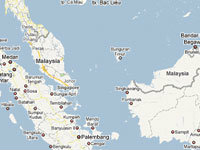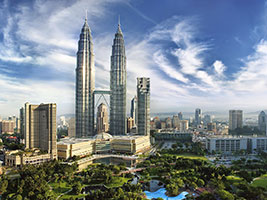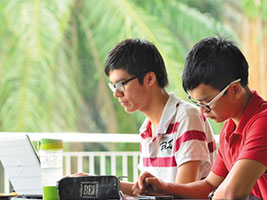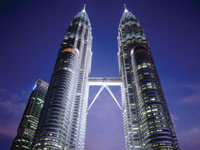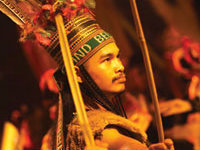Malaysia's Excellent Accomplishments
by StudyMalaysia.com on February 20, 2015 | Why Study in Malaysia
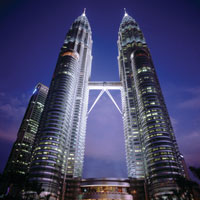
Knowing Malaysia - A Role Model For New Industrialised Nations Introduction to Malaysia
Malaysia has grown tremendously and has become a more developed country over the years since her independence 48 years ago. It has soared like an eagle, evolving into a high technology nation with her own Silicon Valley and, her many high technology buildings, some of which were built to depict the rich heritage of Malaysia, like the Petronas Twin Towers. Malaysia has experienced a steady economic progression and rapid infrastructural development of which Malaysians are truly proud.
Malaysia is a country with a harmonious and peaceful living environment where various ethnic races intermingle amicably with one another through mutual understanding and tolerance fostered through the many decades of togetherness.
Besides these, Malaysia is a Shopping Paradise and is also popularly known as Asia's Food Paradise. The various races, religions and cultures found in Malaysia result in a harmonious blend of mouth-watering food. A much sought-after tourist attraction, Malaysia has been rightfully tagged 'Malaysia, truly Asia' as it offers a wide variety of Asian culture and food.
Education opportunity is abundant for International Students. Come to Malaysia to explore as well as to learn from a country of great diversity, rapid economic development and with people living in a peace and harmony!
This segment of Knowing Malaysia will provide a general outline of the nature, economy, security, races and cultures of Malaysia among other relevant and interesting information before delving deeper into each of the main aspects and features in the following segments.
Malaysia's Location and States in Brief (Superb Location & Co-Exist Neighbourhood)
Being one of the most developed countries in the ASEAN region, Malaysia, which sits at the core of South-East Asia, directly below Thailand and above Singapore, is made up of the high-end technologically-developed West Malaysia and the more pristine East Malaysia, well-known for eco-tourism and nature tourism.The two lands are however, separated by the South China Sea. While West Malaysia (Peninsular Malaysia) encompasses 13 states and three Federal Territories (namely, Kuala Lumpur - the capital; Putrajaya - the new Administrative centre; and Labuan -an island off the coast of Sabah), East Malaysia, on the other hand, consists of the states of Sabah and Sarawak on the island of Borneo.
Malaysia is one of the founding members of ASEAN and has a diversity of beliefs and cultures. Malaysia co-exists harmoniously with the neighbouring countries in the Asian region as well as with the world.

Malaysia's Races and Religions in Brief (Harmonious Multicultural Society)
Malaysia is a multi-ethnic country with a population of 24.3 million, comprising 16.06 million Bumiputras (66.2%), 6.1million Chinese (25.1 %), 1.8 million Indians (7.4%) and 312,000 (1.3%) people of other races. It is a melting pot of colourful cultures and ethnic diversities - a healthy mix of Malays, Chinese, Indians, and other aboriginal inhabitants: the "orang asli" in Peninsular Malaysia and the "pre-bumis" (in East Malaysia).Bahasa Melayu is the country's national language, but citizens speak freely their own languages and dialects as well as languages from other parts of the world including the English language, which is widely-spoken by most of the people in Malaysia. Mandarin, the Chinese language, is widely spoken by the Malaysian Chinese besides their respective dialects like Cantonese, Hokkien, Hakka and others. The Malaysian Indian community's dialects include Punjabi and Tamil among others.
Apart from permitting the citizens the freedom to speak different languages and dialects, the government of Malaysia also allows the freedom of beliefs and worships. As such, Malaysians embrace diverse religions like Buddhism, Christianity, and Hinduism, although Islam is declared as the nation's official religion.
Malaysian Government in Brief (Politically Stable Government)
Malaysia practises democratic ruling with a Prime Minister at the helm, who is, at present, YAB Dato' Sri Mohd.Najib bin Tun Haji Abdul Razak. The head of the state is His Majesty The Yang di-Pertuan Agong who is elected every five years from one of the nine hereditary rulers or sultans and the country is under a system of constitutional monarchy.This politically-stable nation emphasizes the sharing of power amid its ethnicity of races and the Government ensures a peaceful and harmonious relationship among the races, thus enabling Malaysia to gain recognition and acknowledgement as a "role model" country which is stable and peaceful. 'Barisan Nasional' (or National Front) the political coalition that manages and governs the nation is made up of UMNO (representing the interest of Malay), MCA (representing the interest of Chinese), MIC (representing the interest of India) and other ethnic-based political parties.
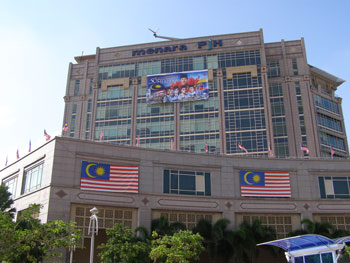
Malaysian Economy in Brief (Strong Economy)
Malaysia has a very highly-diversified economic structure. Malaysia is stable and prosperous economically, and has evolved remarkably over the past decades into a prosperous nation. With a strong banking sector, low interest rate, moderate inflation, and low unemployment rate of 3.5%, Malaysia provides an environment conducive for growth.The Malaysian economy is expected to remain sound and favourable throughout 2005 and a growth of 5.1% gross domestic product (GDP) is expected. The first quarter of 2005 has already seen an increase of 5.7% - the growth being powered by strong performance in the agriculture, commodities and services sectors.
The shift towards industrialization has redirected the nation's dependence towards manufactured products such as electrical and electronics (E&E) goods. The year 2005 has seen a strong improvement in the exports of E&E products. Malaysia also takes pride in being one of the world's largest exporters of palm oil, natural rubber, natural gas production, timber, cocoa beans, and pepper. The chemical products industry recorded a higher growth of 13.4% due to the higher production of industrial gases in 2005. In terms of international achievements, the country has risen, within a relatively short span of time, to be among the top 20 trading nations in the world, and this status has been further underscored by the ranking made by US-based Foreign Policy Magazine that states Malaysia as among the world's most globalised countries.
The Bank Negara Malaysia's total international reserves amounted to USD74.8 billion in mid-May 2005 and are sufficient to finance 8.7 months of retained imports and 7.2 times the short-term external debt. Malaysia's official reserve assets amounted to USD73.289 billion with other foreign currency assets amounting to USD448.43 million.
As at December 2004, Malaysia's total trade stood at USD231,794 million (USD126,511 million for exports and USD105,283 million), with more than 22 trading partners worldwide. The per capita income is USD4,373.
Malaysia has also emerged as the first country to issue global Islamic bonds, known as the Sukuk Al-Ijarah. Another significant achievement of the country was the establishment of the Islamic Financial Services Board in Kuala Lumpur to ensure stability and to strengthen the global Islamic financial industry. With these achievements, Malaysia has now become a model in the expansion of the Islamic financial system among Islamic countries. Recognised as an advanced and progressive Islamic nation, Malaysia has succeeded in undertaking the jihad in many aspects of development, particularly in economic, social, religious and political development. Malaysia has proven the capability of the Islamic community in this age.
On 21st July 2005, the Ringgit-peg against USD at USD1=RM3.80 has been removed and moved to a managed float against a basket of currencies.
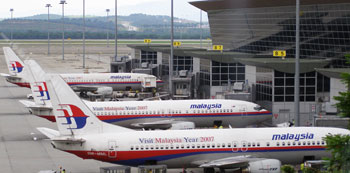
Malaysia's Infrastructure in Brief (Excellent Infrastructure)
Malaysia has seen a fast development of excellent infrastructures which make commuting a more pleasurable and convenient activity with well-connected transportation and communication systems within the country and the rest of the world. This makes Malaysia a country with one of the most developed state-of-the-art infrastructures in Southeast Asia, which is comparable to that in developed nations. Internally, Malaysia is connected by easily-accessible transportations like the KTM (Keretapi Tanah Melayu) trains, the Light Rail Transit (LRT), the Monorail within Kuala Lumpur city and buses as well as taxis.Among the international milestones which Malaysia has achieved in the area of infrastructure development is the spectacular Fourth Best Airport Worldwide - the Kuala Lumpur International Airport (KLIA), which services most major international airlines. KLIA provides world class facilities and services and was named one of the world's best airports for customer satisfaction in 2005.
Other international milestones for Malaysia include the Formula One (F1) circuit in Sepang that hosts the F1 Grand Prix Championship every year; the tallest twin-tower in the world - the Petronas Twin Towers; the Kuala Lumpur Telecommunications Tower; Kuala Lumpur Conventional Centre; the 848-km North-South Expressway which impressively connects the North of Peninsular Malaysia in Bukit Kayu Hitam (border to Thailand) to the South in Johor Bahru (border to Singapore). This has brought essential development indirectly to the rural areas besides shortening the travel time for millions of commuters.
In addition, Malaysia is also well-linked by sea, with remarkably-built sea ports in the states of Selangor, Penang, Johor, and Labuan, as well as the cities of Langkawi and Kuantan. The country's largest seaport is the leading shipping and cargo terminal, Kelang Container Terminal, in Port Klang (Selangor), which is located midway on the west coast of Peninsular Malaysia.
Malaysia's Technology, Telecommunication & Internet Infrastructure in Brief (Huge Investment)
Malaysia has invested heavily in the telecommunication infrastructures which include high-end technology infrastructures such as the Multimedia Super Corridor within which visitors can see the world's first 'smart cities' Putrajaya - the administrative centre and Cyberjaya. High-end ICT is also used for the internal transportations like the KL Express Rail Link and The Light Rail Transit (LRT).Malaysia's Telecommunication and Internet infrastructure has also developed tremendously and has surpassed many countries around the region. We have the existing satellites facilities like MEASAT 1 & 2 and the up-coming MEASAT 3, which serve most of the Malaysia's key ICT companies like Telekom Malaysia, Radio Televisyen Malaysia, TV3, NTV7, Maxis, DIGi, Celcom and Astro besides high-profile international companies like BBC Worldwide, VTV and Globe Telecom.
Besides the Wireless Access Point (WAP) for internet access, Wireless Broadband and Wi-fifacilities, Malaysian Telecommunication has also developed to be on par with the developed countries with the introduction of 3G (3rd Generation) services in mobile phones. Mobile Service Providers Celcom and Maxis - two of the top mobile service providers in the country - are now offering the 3G technology for mobile phone users. 3G which means 3rd Generation has many attractive features like receiving TV channels, internet movies, video-clip advertisements, voice over as well as sending and receiving video conferencing, plus MMS, SMS and other normal mobile phone facilities.
Malaysian Sports in Brief (Set to Achieve Excellence)
Attractive incentives are given to high achievers in sports especially those who are able to win medals in the international competition. Sport facilities are readily available almost everywhere in Malaysia. You can find sports facilities in sport complexes, campuses of higher educational institutions and in some places there are facilities for leisure activities in the parks. Our sports such as Badminton, Bowling and Squash, just to name a few, have accomplished world standard.In the past years, many Malaysians have made their mark in world sports events. For example Esther Cheah was the world champion in the Women's World Bowling Championship at Aalborg in Dennark and Nicol David won the gold medal in the women's squash competition at the World Games in Duisburg, recently. In water sports, Azri Yahaya was the world champion under Class One (eight to nine year-olds) in last year's Formula Future World Championships. Tan Boon Heong and Hoon Thien How won the world junior doubles badminton title in Vancouver, Canada while Bryan Nickson Lomas won the world junior diving title in the 14 - 15 age group 3m springboard event in Belesu, Brazil. Lim Siew Ai, an international golfer, competes in major circuit like the US LPGA tour.
Two Malaysians have successfully swum non-stop across the English Channel. They are Datuk Abdul Malik Mydin in 2003 and Lennard Lee in 2004. Datin Paduka Sharifah Mazlina is the first Asian women to ski-sail across the Antartic. Badminton players Lee Chong Wei and Mohd Hafiz Hashim are ranked number 6 and 8 respectively in the world badminton rankings for June 2005.
Malaysia's Various Attractions and Happenings in Brief (Haven for Tourists)
All the 13 states in Malaysia are unique with multifarious customs and cultures that offer diverse attractions and cultural heritages, which will fascinate foreigners visiting Malaysia. The captivating beauty which the country possesses will please visitors going about their tours of the many interesting places and 'must-do' activities, such as shopping in the numerous shopping complexes; taking eco-touring into the lush and pristine rainforests and other scenic spots; strolling along the theme parks and farms; getting involved in sports and games; besides many other exciting activities.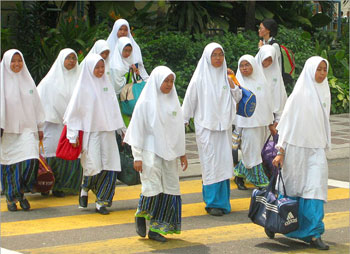
Excellence in the Education Sector (Aspiring to be the World's Best)
Education and development of human capital are always the top priority of the Government. The Malaysian education sector has grown tremendously during the past decade, giving Malaysia the acknowledgment as a centre of educational excellence in the region. This is a very befitting acknowledgement, as Malaysia has established 17 public educational institutions (which include an International Islamic University), 21 private universities, 5 foreign university branch campuses, more than 500 private colleges, as well as 32 international schools and 14 expatriate schools for local as well as international academic needs.At present, there are more than 40,000 (figure as in 2005) foreign students of which 95% from a total of 40 countries (and another 5% from the other 100 countries) are pursuing their pre-tertiary and tertiary studies at the Malaysian educational institutions. Underlying our reputation as a provider of quality education is the fact that renowned foreign universities from UK and Australia have set up their branch campuses here, while various other higher institutions from US, Canada, French, Germany and New Zealand are offering twinning as well as franchised degree programmes in partnership with Malaysian colleges and universities.
Malaysia - At Present and in Future
Malaysia is seen, in the present times, as a fast developing country which has undergone tremendous progress. On the international circuit, Malaysia has been acknowledged globally for the many numerous achievements attained by the country as a whole and by the citizens at the individual level.Under the leadership of the Malaysian Prime Minister, YAB Dato' Sri Mohd.Najib bin Tun Haji Abdul Razak, Malaysia will continue to play an increasingly prominent role as a global participant in today's world that knows no boundaries, and further carve a name for itself, internationally in the political, economic, social, and cultural arena.
Note - All the currency conversion is based on USD1 = RM3.80 (Malaysia's Ringgit pegged against USD at USD1=RM3.80 has been removed on 21-7-2005).
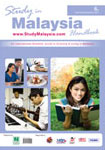 Source: Study in Malaysia Handbook 8th Ed.
Source: Study in Malaysia Handbook 8th Ed.All rights reserved. No part of this editorial contents may be reproduced, copied, translated, or stored in a retrieval system or transmitted in any form or by any means without the written consent from the publisher Challenger Concept (M) Sdn Bhd (www.studymalaysia.com/challenger)
You May Also Be Interested In...
�Map of Malaysia
![�Map of Malaysia - StudyMalaysia.com]() Malaysia is situated in South-eastern Asia, between 2 and 7 degrees no...
Malaysia is situated in South-eastern Asia, between 2 and 7 degrees no...About Malaysia
![About Malaysia - StudyMalaysia.com]() So, you’re considering Malaysia as your higher education destination...
So, you’re considering Malaysia as your higher education destination...Tertiary Education for International Students - Where Best to Get It
![Tertiary Education for International Students - Where Best to Get It - StudyMalaysia.com]() The global market for tertiary education now offers more choices of de...
The global market for tertiary education now offers more choices of de...�Cost of Studying and Living in Malaysia
![�Cost of Studying and Living in Malaysia - StudyMalaysia.com]() One of many reasons why international students choose Malaysia is beca...
One of many reasons why international students choose Malaysia is beca...Malaysia's Excellent Accomplishments
![Malaysia's Excellent Accomplishments - StudyMalaysia.com]() Malaysia has grown tremendously and has become a more developed countr...
Malaysia has grown tremendously and has become a more developed countr...Malaysia - Facts At A Glance
![Malaysia - Facts At A Glance - StudyMalaysia.com]() Read about Malaysia's facts and figures here.
Read about Malaysia's facts and figures here.


















